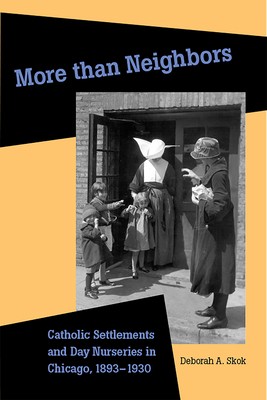
- We will send in 10–14 business days.
- Author: Deborah Skok
- Publisher: Northern Illinois University Press
- ISBN-10: 0875803741
- ISBN-13: 9780875803746
- Format: 16.2 x 23.2 x 2.3 cm, hardcover
- Language: English
- SAVE -10% with code: EXTRA
Reviews
Description
The influx of southern and eastern European immigrants to the United States at the beginning of the twentieth century resulted in a stereotype of Catholics as poor, illiterate laborers. As prejudice against the unwelcome newcomers spread, Irish- and German-American Catholics--many of whom were American-born--felt threatened. Although genuinely concerned about the welfare of fellow Catholics, they feared the loss of their hard-earned economic security and slowly rising social position. By identifying common interests, the women of Chicago's Catholic community found a solution that simultaneously served the needy and cemented the status of the middle class.
In More than Neighbors, Deborah A. Skok tells the story of Chicago's Catholic settlement houses and day nurseries and the cross-class alliances they fostered. For poor women, these institutions provided child care, social services, and employment. For white-collar working girls, they offered volunteer opportunities as well as classes on job skills. For upwardly mobile women, they afforded the ability to demonstrate Christian charity and to take leading roles in the political and cultural life of the city. Settlements enabled Catholic women from all social strata to come together for their mutual benefit, despite conflicts over issues of class and ethnicity.
By giving equal attention to the religious as well as to the social component of the settlement house movement, Skok illuminates the dynamics of class mobility, ethnic group interaction, and the gendered relations of power. Historians can no longer ignore the significance of Jane Addams' neighbors.
EXTRA 10 % discount with code: EXTRA
The promotion ends in 19d.03:27:22
The discount code is valid when purchasing from 10 €. Discounts do not stack.
- Author: Deborah Skok
- Publisher: Northern Illinois University Press
- ISBN-10: 0875803741
- ISBN-13: 9780875803746
- Format: 16.2 x 23.2 x 2.3 cm, hardcover
- Language: English English
The influx of southern and eastern European immigrants to the United States at the beginning of the twentieth century resulted in a stereotype of Catholics as poor, illiterate laborers. As prejudice against the unwelcome newcomers spread, Irish- and German-American Catholics--many of whom were American-born--felt threatened. Although genuinely concerned about the welfare of fellow Catholics, they feared the loss of their hard-earned economic security and slowly rising social position. By identifying common interests, the women of Chicago's Catholic community found a solution that simultaneously served the needy and cemented the status of the middle class.
In More than Neighbors, Deborah A. Skok tells the story of Chicago's Catholic settlement houses and day nurseries and the cross-class alliances they fostered. For poor women, these institutions provided child care, social services, and employment. For white-collar working girls, they offered volunteer opportunities as well as classes on job skills. For upwardly mobile women, they afforded the ability to demonstrate Christian charity and to take leading roles in the political and cultural life of the city. Settlements enabled Catholic women from all social strata to come together for their mutual benefit, despite conflicts over issues of class and ethnicity.
By giving equal attention to the religious as well as to the social component of the settlement house movement, Skok illuminates the dynamics of class mobility, ethnic group interaction, and the gendered relations of power. Historians can no longer ignore the significance of Jane Addams' neighbors.


Reviews